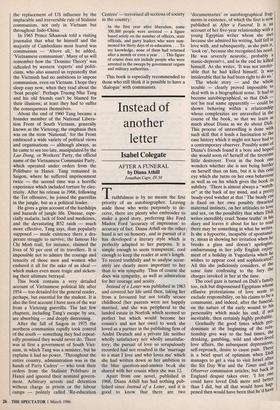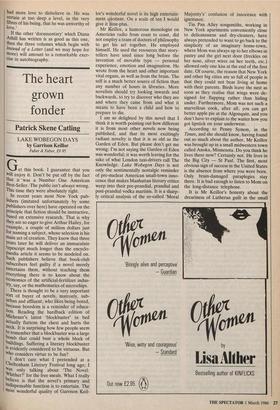Instead of another letter
Isabel Colegate
AFIER A FUNERAL by Diana Athill
Jonathan Cape, f9.50
Truthfulness is by no means the first priority of an autobiographer. Leaving aside those who write purposely to de- ceive, there are plenty who embroider to make a good story, preferring like Ford Madox Ford 'accuracy of impression' to accuracy of fact. Diana Athill on the other ; hand is set on honesty, and in pursuit of it has developed - a literary style which is perfectly adapted to her purpose. It is simple enough to seem transparent, cool enough to keep the reader at arm's length. To record truthfully and to analyse accur- ately are clearly more important to her than to win sympathy. Thus of course she does win sympathy, as well as admiration for her courage and acuity.
Instead of a Letter was published in 1963 and covered her life until then, taking her from a favoured but not totally secure childhood (her parents were not happily married, and she was peripheral to the landed estate in Norfolk which seemed so perfect but which would become her cousin's and not her own) to work she loved as a partner in the publishing firm of Andre Deutsch and a, private life neither wholly satisfactory nor wholly unsatisfac- tory; the pursuit of love so scrupulously recorded had not resulted in the 'marriage to a man I love and who loves me' which she had written down as her ambition in the blue question-and-answer book she shared with her cousin when she was 12.
Apart from one novel, published in 1968, Diana Athill has had nothing pub- lished since Instead of a Letter, and it is good to know that there are two `documentaries' or autobiographical frag- ments in existence, of which the first is now published as After a Funeral. It is an account of her five-year relationship with a young Egyptian writer whom she met because she admired his writing, half fell in love with, and subsequently, as she puts it, `took on', because she recognised his need. He was severely neurotic, probably a manic-depressive, and in the end he killed himself. As she writes, 'It was not intoler- able that he had killed himself. It was intolerable that he had been right to do so.' The whole story — and the whole trouble — clearly proved impossible to deal with in a biographical sense. It had to become autobiographical, so that Didi — not his real name apparently — could be shown behaving within a relationship whose complexities are unravelled in the course of the book, so that we learn as much about Diana as we do about Didi. This process of unravelling is done with such skill that it lends a fascination to the case history which it might not have had to a contemporary observer. Possibly some of Diana's friends found it a bore and hoped she would soon rid herself of the tiresome little destroyer. Even in the book one wonders whether she is not being harder on herself than on him, but it is this cold eye which she turns on her own behaviour as well as on his which gives the book its subtlety. 'There is almost always a "watch- er" at the back of my mind, and a pretty beady-eyed watcher at that.' The beady eye is fixed on her own possibly thwarted maternal instincts, on her attitudes to love. and sex, on the possibility that when Didi writes incredibly cruel 'home truths' in his diary and leaves it about for her to read there may be something in what he writes. Is she a hypocrite, incapable of spontanei- ty, mean in showing her irritation when he breaks a glass and doesn't apologise, embarrassing in her jolly English enjoy- ment of a holiday in Yugoslavia when he wishes to appear cool and sophisticated? All this she judiciously considers, at the same time confessing to the fury the charges invoked in her at the time. The cool gaze is turned on Didi's faMilY too, rich but dispossessed Egyptians whose effusive protestations of love seem t° exclude responsibility, on his claims to be a communist, and indeed, after the funeral, on the nature of the early wound to his personality which made his end, if not inevitable, then certainly highly probable. Gradually the good times which Pre- dominate at the beginning of the rela- tionship give way to the bad times, the drinking, gambling, wild and short-lived love affairs, the subsequent depressions, self-reproach, desire to cause pain. There is a brief spurt of optimism when Didi manages to get a visa to visit Israel after the Six Day War and the Times and the Observer commission articles; but back 111 England despair takes over. 'I for 00 could have loved Didi more and better than I did, but all that would have hap- pened then would have been that he'd have had more love to disbelieve in. He was certain at too deep a level, in the very fibres of his being, that he was unworthy of love.'
If the other 'documentary' which Diana Athill has written is as good as this one, then the three volumes which begin with Instead of a Letter (and we may hope for more) will amount to a remarkable exer- cise in autobiography.















































 Previous page
Previous page